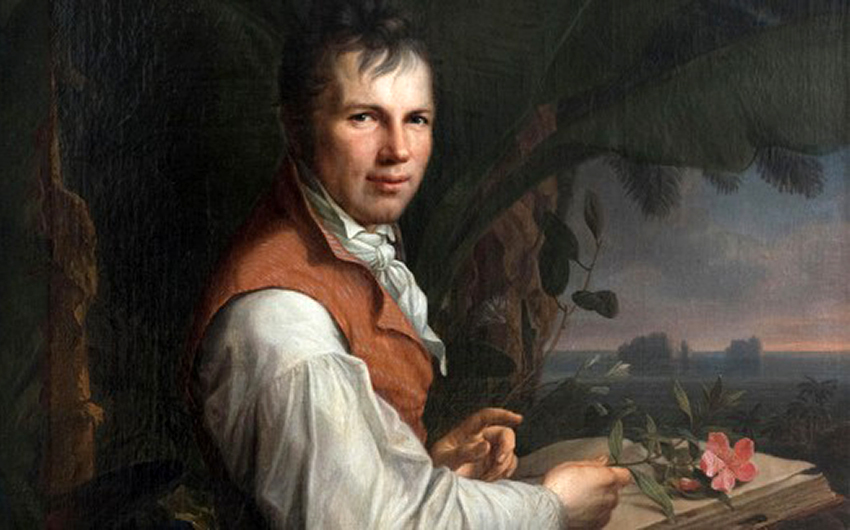"I almost love this man," Charles Darwin once wrote about Alexander von Humbolt. The renowned inventor of the theory of evolution did not hide his admiration for Humboldt. Without Humboldt, there probably would be no theory of evolution, for Darwin found the blueprint for this in his writings.
However, unlike Darwin, Humboldt does not have a major discovery to his credit. This Prussian scientist, naturalist and explorer, a combination of Indiana Jones and Stephen Hawking, came up with a world view in the early 19th century in which nature as a web of life is all-encompassing and in which everything is interconnected. Humboldt also noted for the first time the destructive influence of humans. In the 20th century it was somewhat forgotten. Who was this exceptional man and why is his world view so important now?
Alexander von Humboldt was born in Berlin on September 14, 1769, in a noble family. At a very young age he developed a great interest in nature in his immediate vicinity. Perhaps he was already captivated by what the Germans call "Fernweh", a longing for faraway places. His life-defining expedition took him to a wide area around Central America, the Caribbean and the north of South America. From the Spanish port of La Coruna, Humboldt left for the West on June 5, 1799, eventually arriving in present-day Venezuela.
During his journey of hardship, he would discover and contemplative come to the conclusion that everything is interrelated: geography, anthropology, biology, and politics. Colonialism, slavery, climate and economy balancing on the fragile foundations of nature. With a distinctive cosmic look, he would view and describe everything as a whole. At Lake Valencia he saw the devastating hand of man in nature. Deforestation by European planters left the Earth's surface relentlessly at the mercy of the scorching sun. Extreme evaporation led to heavy rains, which then washed away the bottom. The land was misused for quick profit, but this inevitably led to disaster for the population. Humans could cause climate change, according to Humboldt. Foresight.
Humboldt saw the haunting beauty of existence. The emergence of diversity through climatic and environmental factors fascinated him. In everything he saw first nature, as he had done from an early age in a man-dominated environment. Every observation was part of something bigger, something with a shared beating heart.
Humboldt sailed up the mighty Orinoco River, only to return to the Venezuelan coast after more than 2,200 kilometers, partly by land. An expedition of more than four months through at that time unknown, largely uninhabited area, covered with dense jungle. Humboldt climbed several volcanoes. He describes the earthquake that took place during the second ascent very accurately. It all had to be related. He also climbs the more than six thousand meter high peak in the Andes, Chimbarazo, known at the time as the highest mountain in the world. Almost at the top of that mountain he had his aha experience: surveying the landscape, he came to the insight that nature is one large organism, a connected web of life. Nature is a living whole, not an unemployed mass. Human intervention in this could not be without consequences.
Humboldt painted the Earth as a living planet with a large skin, which fluctuates temperatures while breathing, can become ill and then show symptoms. He was a child of the Enlightenment, a restless homo universalis, a know-it-all with an extraordinary memory who pursued his dream of travel and discovery. Perhaps in the end much more of a connector than a discoverer. The forefather of the nature movement and a visionary. He is a voice from the past with a message for the present. Above all, Humboldt was the first to realize that humans can influence the climate. Now that the consequences of this influence are alarmingly clear, the question is whether we will act in time to turn it back and keep the earth in its current, breathtaking form. Nature has become political, the climate is economic. Globalism has replaced colonialism. Companies are now connecting countries. Awareness of the problem is the first step. But more is needed. Now more than ever, we need Humboldt's vision to tackle climate change. Humboldt was driven by a connection with and admiration for nature. Nature that can only be truly understood through imagination, emotions and feeling. It now takes a generation to share this with him and act on it. We can only truly protect nature effectively if we genuinely love it. Humboldt's love for nature was intense and unconditional. Humboldt is the classic hero that the modern world needs.












Source: Evertjan van Roekel, De grootste liefdes in mijn leven zijn de wetenschappen en de natuur. Alexander von Humboldt, visionair en held, BeleggeninWindenergie.nl.